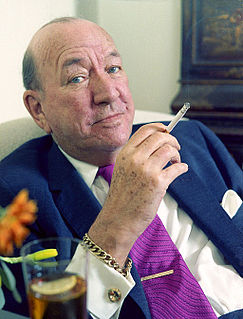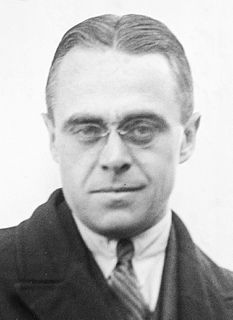
Private Lives is a 1930 comedy of manners in three acts by Noël Coward. It concerns a divorced couple who, while honeymooning with their new spouses, discover that they are staying in adjacent rooms at the same hotel. Despite a perpetually stormy relationship, they realise that they still have feelings for each other. Its second act love scene was nearly censored in Britain as too risqué. Coward wrote one of his most popular songs, "Some Day I'll Find You", for the play.

Blithe Spirit is a comic play by Noël Coward. The play concerns the socialite and novelist Charles Condomine, who invites the eccentric medium and clairvoyant, Madame Arcati, to his house to conduct a séance, hoping to gather material for his next book. The scheme backfires when he is haunted by the ghost of his annoying and temperamental first wife, Elvira, after the séance. Elvira makes continual attempts to disrupt Charles's marriage to his second wife, Ruth, who cannot see or hear the ghost.

Bitter Sweet is an operetta in three acts, with book, music and lyrics by Noël Coward. The story, set in 19th century and early 20th century England and Austria-Hungary, centres on a young woman's elopement with her music teacher. The songs from the score include "The Call of Life", "If You Could Only Come with Me", "I'll See You Again", "Dear Little Café", "If Love Were All", "Ladies of the Town", "Tokay", "Zigeuner" and "Green Carnation".
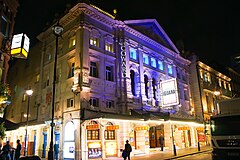
The Noël Coward Theatre, formerly known as the Albery Theatre, is a West End theatre on St. Martin's Lane in the City of Westminster, London. It opened on 12 March 1903 as the New Theatre and was built by Sir Charles Wyndham behind Wyndham's Theatre which was completed in 1899. The building was designed by architect W. G. R. Sprague with an exterior in the classical style and an interior in the Rococo style.

Present Laughter is a comic play written by Noël Coward. The play's title comes from a song in Shakespeare's Twelfth Night, which urges carpe diem, and so the word present in the title should be pronounced as the adjective, not the verb.
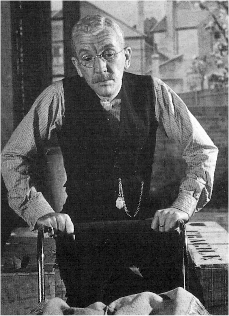
This Happy Breed is a play by Noël Coward. It was written in 1939 but, because of the outbreak of World War II, it was not staged until 1942, when it was performed on alternating nights with another Coward play, Present Laughter. The two plays later alternated with Coward's Blithe Spirit. The title, a reference to the English people, is a phrase from John of Gaunt's monologue in Act II, Scene 1 of William Shakespeare's Richard II.
Sheridan Morley was an English author, biographer, critic and broadcaster. He was the official biographer of Sir John Gielgud and wrote biographies of many other theatrical figures he had known, including Noël Coward. Nicholas Kenyon called him a "cultural omnivore" who was "genuinely popular with people".

Fallen Angels is a comedy by the English playwright Noël Coward. It opened at the Globe Theatre, London on 21 April 1925 and ran until 29 August. The central theme of two wives admitting to premarital sex and contemplating adultery met hostility from the office of the official theatre censor, the Lord Chamberlain, and the necessary licence was granted only after the personal intervention of the Chamberlain.
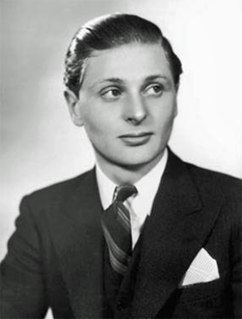
Hugh "Binkie" Beaumont was a British theatre manager and producer, sometimes referred to as the "éminence grise" of the West End theatre. Though he shunned the spotlight so that his name was not known widely among the general public, he was one of the most successful and influential manager-producers in the West End during the middle of the 20th century.
The Rat Trap (1918) is a four-act drama by Noël Coward, his 'first really serious attempt at psychological conflict', written when he was only 18.
The Better Half is a one-act play by Noël Coward first performed in 1922 by the Grand Guignol theatre company. It was never published and thought to be lost until Richard Hand and Mike Wilson, researchers writing a book on the theatre company, discovered it in the British Library in September 2007, where it had been deposited as part of the Lord Chamberlain's Plays collection. According to Wilson, the play is about a "husband and wife [who] are in an unhappy relationship and he is about to embark on an affair, but he is an honourable man and refuses to consummate it... They are trying to keep it away from the wife but unknown to him, she already knows and is trying to encourage it because she knows they are unhappy."
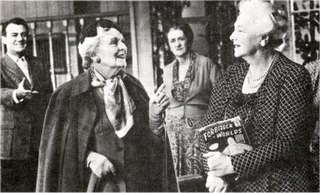
Waiting in the Wings is a play by Noël Coward. Set in a retirement home for actresses, it focuses on a feud between residents Lotta Bainbridge and May Davenport, who once both loved the same man.
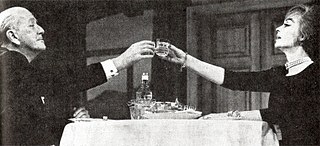
A Song at Twilight is a play in two acts by Noël Coward. It is one of a trio of plays collectively entitled Suite in Three Keys, all of which are set in the same suite in a luxury hotel in Switzerland. The play depicts an elderly writer confronted by his former mistress with facts about his past life that he would prefer to forget.
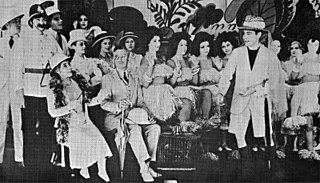
Words and Music is a musical revue with sketches, music, lyrics and direction by Noël Coward. The revue introduced the song "Mad About the Boy", which, according to The Noël Coward Society's website, is Coward's most popular song. The critics praised the show's sharp satire and verbal cleverness.
Post Mortem is a one-act play in eight scenes, written in 1930 by Noël Coward. He wrote it after appearing in, and being moved by, an earlier play about World War I, Journey's End by R. C. Sherriff. As soon as he had completed writing it, however, he decided that it was suitable for publication but not for production.
Frank Barrie is a British stage and television actor. He made his acting debut in 1959 in a production of Henry IV, Part 2 at the York Theatre Royal. He proved to be a successful Shakespearean actor throughout his career and spent three years as a leading member of Laurence Olivier's National Theatre Company at the Old Vic. More recently, he starred in Lunch with Marlene, a 2008 tribute to Noël Coward and Marlene Dietrich and in 2010 was cast as [[Edward Bishop the gentleman friend of Dot, in East Enders. He has made over 200 television appearances.
Adventure Story is a British television play, based on the stage play by Terence Rattigan, and tells the story of Alexander the Great and his conquest of Persia. It featured Sean Connery in his first starring role and was praised at the time for its acting.
Photograph 51 is an award-winning play by Anna Ziegler. Photograph 51 opened in the West End of London in September 2015. The play focuses on the often-overlooked role of X-ray crystallographer Rosalind Franklin in the discovery of the double helix structure of DNA while working at King's College London. This play won the third STAGE International Script Competition in 2008. The title comes from Photo 51, the nickname given to an X-ray diffraction image taken by Raymond Gosling in May, 1952, under the supervision of Rosalind Franklin. The one-act play runs for 95-minutes with no intermission.
